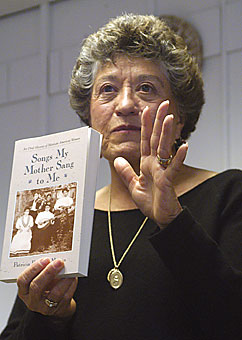 |
|
AURORA HIGGINSON/Arizona Daily Wildcat
|
Patricia Preciado Martin speaks at the César E. Chávez building about her book on Mexican-American art, history and culture
|
|
|
By Djamila Noelle Grossman
Arizona Daily Wildcat
Tuesday, February 22, 2005
Print this
Patricia Preciado Martin tells other people's stories.
The author of six books held a lecture at the César E. Chávez building yesterday and presented her new book "Beloved Land: An Oral history of Mexican Americans in Southern Arizona."
The book is a compilation of stories about Mexican-Americans who grew up in Arizona.
Preciado Martin said that before she became a writer, she never felt passionate about anything. Encouraged by her husband, she tried to publish stories she had told her children during camping trips. After unsuccessful attempts, a woman told her to write about her own history.
"It was the first time someone encouraged me to write about my culture. I remember getting goose bumps," Preciado Martin said.
Soon after Preciado Martin wrote about her Mexican-American background, the book was published.
She said that in the book, she tries to show the positive aspects of her culture, which she wants to preserve. Many relics are already lost in Arizona, but there are still many things that remind her of her background, Preciado Martin said.
"We are here; our presence is very powerful," Preciado Martin said. "It's nowhere I can go without finding my Mexican roots, even if it's at the Foothills Mall."
Preciado Martin talked about the simple farm life of many people who lived in Arizona after coming from Mexico. She said her grandmother didn't write or read, but she said that because of her stories, Preciado Martin is a published author.
She said people should be more proud of women, because they have done hard work, but they hardly get mentioned.
The author herself said she had a hard time finding out about her passion and encourages all people, especially women, to do what they feel is best for them.
"I feel that I have done everything that my heart wants to do," Preciado Martin said.
Cynthia Corona, a Mexican-American studies graduate student, said she came to the lecture to support Preciado Martin's research, because it mixes with her own family's background.
"I thought it was wonderful. She is truly trying to document Mexican history; it's tremendous what she has done so far," Corona said.
Catrin Lundström, a visiting sociology scholar from Sweden, said she thought the lecture was based on real-life issues, and Preciado Martin managed to make the audience feel very close to the stories she told.
"I have read what I could find in Sweden on the topic, but here is the real source," Lundström said in regards to the rich history Tucson offers in Mexican-American culture.
